Yellow is, along with blue and redthe third primary color. However, announced as the favorite by only 6% of men and women, it is far from enjoying the sexy aura of its congeners. On the contrary, yellow is said to have declined in value over the centuries. The good news is that when you're in the doldrums... you can't help but rise again! That's why Michel Pastoureau, in his book Les couleurs expliquées en images, is betting on yellow's recovery in the coming decades. So why all the hatred?

Antique Gold and Enamel Slavery Necklace
Beyond the color's negative symbolism, which has its roots in medieval Europe, yellow is a tangible representation of the passage of time. Think, for example, of autumn leaves that take on warm hues before dying, or photographs that turn yellow over time. Or, even more tangibly, our teeth, the whites of our eyes and our fingernails, which lose their initial whiteness as we age.
Since Chateaubriand's 19th-century assertion that "old age is a shipwreck", our still ageist society doesn't quite seem to have emerged from sovereign youth. Isn't that Leonardo (Di Caprio)? The 48-year-old actor is reputed to have only female companions under the age of 25. In other words, they weren't even born when Titanic hit theaters.
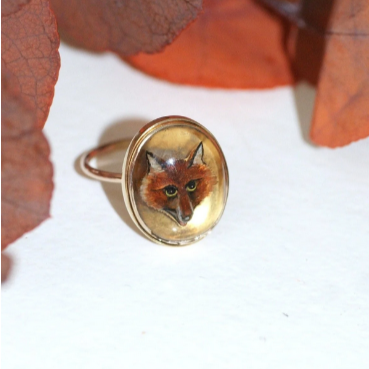
Old ring fixed under glass Fox
Jaundice, liver failure, a waxy complexion - yellow also evokes illness, making us laugh... yellow! Do you know where the expression comes from? It's said to be linked to saffron, which is yellow in color and supposed to cause delirium accompanied by uncontrollable laughter.
The unloved
From the Middle Ages onwards, yellow took on a negative symbolism in Europe. This was largely due to the contribution of the Catholic religion, which after the Crusades continued to hunt down those it deemed heretical, this time within the country itself.
Painting didn't help either, as it wasn't until the 19th century that yellow was rehabilitated in Art History. But let's return to the medieval period and the paintings of the time, through the example of Judas.

Giotto, The Arrest of Christ (The Kiss of Judas), 1304-1306, Fresco, Padua, Scrovegni Chapel.
An archetypal traitor, Judas is often depicted with stigmatizing attributes. Sometimes left-handed, sometimes red-haired, from the 12th century onwards he is dressed in a yellow robe. From then on, the color became an avatar for cheating and lying, and the association was perpetuated: in the 19th century, adulterous wives and deceived husbands were also depicted dressed in yellow.
Generally speaking, yellow clothing symbolizes opprobrium: in Germany, for example, it was once the attribute of prostitutes and single mothers. More broadly, the color yellow has become the color of stigmatization. Another example is the "rouelle" (a red wheel) introduced by Catholics in the 13th century to ostracize Jews, and adopted by the Nazis in the not-too-distant past for the same reason.
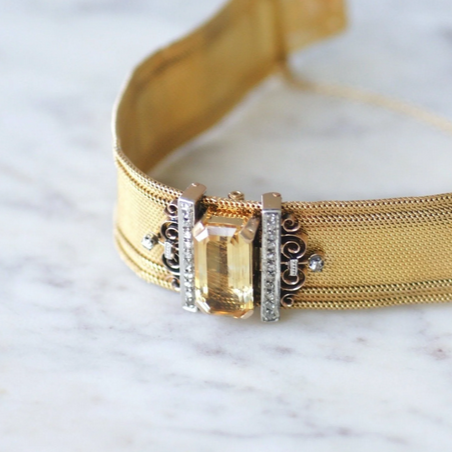
Milanese mesh cuff bracelet with diamonds and citrine
Yellow has also been associated with madness since the Middle Ages, either on its own or in combination with green. green. Saffron was mentioned earlier, but sulfur, straight from the vapors of Hell, is also reputed to cause insanity.
The yellow/green color combination is also the trademark of the Catherinettes, those young women over 25 who are "still" single. Far from symbolizing madness, the chromatic combination represents hope and wisdom. It's customary that on November 25, wearing a yellow and green hat, the Catherinette goes to pray to Saint Catherine (the patron saint of marriageable girls), so that please someone will spare her the label of spinster. Don't insist on Leonardo, you're out of the competition. Instead, take Agatha Christie's advice: "Do as I do, marry an archaeologist. He's the only man who will look at you with increasing interest as the years go by".
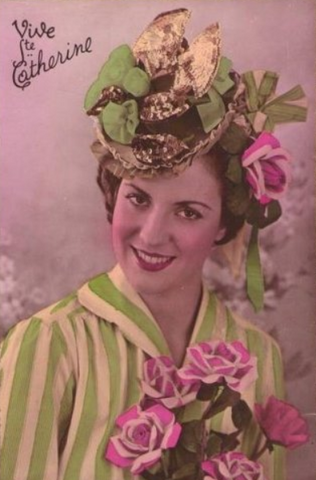
Antique postcard "Vive Ste Catherine
While society has evolved (according to INSEE, the average age of a woman's first marriage was 31.9 in 2016), the tradition of the Catherinettes lives on in some of the major fashion houses. But it's mainly a pretext, it seems, for creating hats, each more extravagant than the last, and celebrating.
Catherinettes, there's no need to wait for your soul mate to buy you a piece of jewelry in 2023: we suggest a citrinea peridot or an emerald to wear your colors proudly on November 25!
Yellow gold
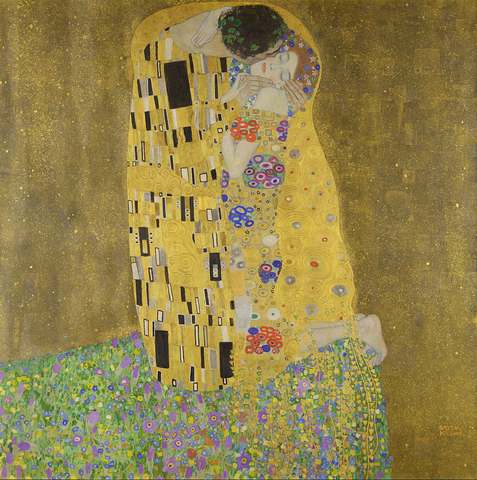
Gustav Klimt, The Kiss, 1908-1909, Oil and gold leaf on canvas, Vienna, Belvedere Palace.
If yellow is a color that's been criticized, it's also because it suffers from its proximity to gold. This proximity is not only chromatic, but also literal: yellow derives from the Latin " aurum " meaning gold. And so, over time, gold has absorbed all the positive symbolism of yellow: light, energy, optimism... Leaving yellow as the poor relation, keeping duplicity, anger, envy and resentment in its fold. The Church once again played a role in this schism, banning yellow as a liturgical color from the 19th century onwards. Gold, on the other hand... no problem.
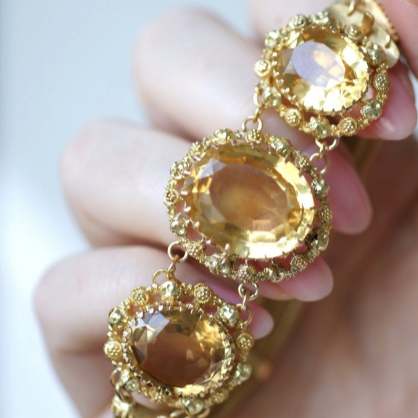
Charles X gold and citrine cuff bracelet
At Galerie Pénélope, we love gold as well as yellow, and perhaps even more so the combination of the two! Especially as the color is found in gemology in an infinite number of shades: amberapatite, citrinechrysoberyl, fluorite, garnet, heliodore, sapphire scapolite, sphene, topaz, tourmaline, zircon. And of course diamond daffodil: you've probably heard of the Tiffany diamond that hangs around Beyoncé's neck in the "About Love" campaign (2021). If not, we talk about it in our article on the birthstone birthstone.
Monday in the sun
It's important to bear in mind that the meaning of colors is intimately linked to a culture circumscribed in time and space. For example, the symbolism of yellow is different in Asia. In China, for example, the color is highly valued and associated with the emperor.
The color was also highly prized in Greco-Roman antiquity, notably for ceremonial garments.
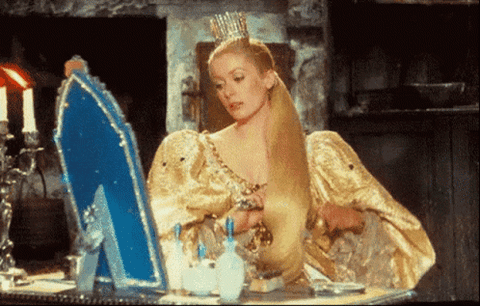
Catherine Deneuve in Peau d'Âne [musical film written and directed by Jacques Demy], 1970.
And what about blond hair! In both Greece and ancient Rome, women used to coat their hair with bleaching agents, while men exposed their hair to the sun to lighten it. It's also rumored that in those days, you could buy expensive blond manes from Germania. Perhaps because in mythology, all the heroes and gods are blond - and who wouldn't want to compete with the Olympians?
And did you know? Quartz with natural rutile needle inclusions (to see what this looks like, take a look at our article on sapphire) are called "Venus hair quartz".
We could cite a plethora of examples of blondness associated with beauty, such as Peau d'Âne in her "sun-colored" dress in the image above, Marilyn Monroe or Brigitte Bardot for the most iconic. As far as the latter two are concerned, we don't want to break the myth, but it would appear that they are "fake blondes". So things haven't changed that much since antiquity, at least on this point: we're still using subterfuges to lighten our hair. In fact, it is estimated that only 2% of the world's population is naturally blonde.
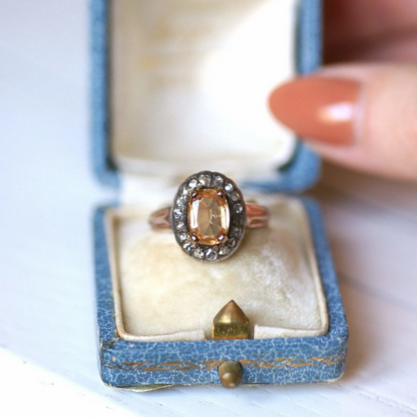
Antique imperial topaz daisy ring surrounded by diamonds
If art history has contributed to the implicit association between yellow and treachery, it is also partly through painting that we are witnessing a revaluation of the color. The English artist William Turner was one of the first to enrich his palette with yellow tones in the early 19th century. This painter strongly influenced the Impressionists, who in turn incorporated yellow into their work. Yellow was also one of Vincent Van Gogh's favorite colors, as in his iconic Sunflowers.
Did you know? Appolon, the Greek god of the arts and the sun, wanted to get rid of his lover Clythia, whom he considered too clingy. Not content with just ghosting her , he turned her into a sunflower. The flower, turned towards the sun (due to Clythia's adoration of Appolon), symbolizes blind passion.
Crocus, daffodils, primroses, mimosas... we'll let you complete the list, because yellow is also the most common color among flower varieties.
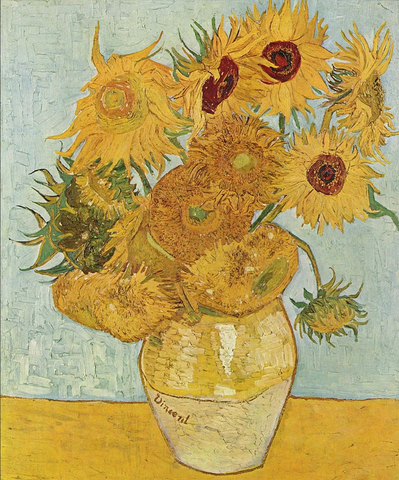
Vincent Van Gogh, Vase with Twelve Sunflowers, 1888, oil on canvas, Munich, Neue Pinakothek.
As in painting, yellow became a symbol of the avant-garde in literature in the 19th century. For example, it graced the covers of sensationalist works. The same type of press was also referred to as "yellow journalism". Marketing avant la lettre: the boldness of the color was used to attract attention. While some traditionalists view this kind of literature with suspicion, others see it as a transgression. Yellow thus became the banner of an avant-garde freed from the artistic and moral yoke of its time. In 1890, the British poet Richard le Gallienne praised the color in his essay Le boom en jaune.
At the beginning of the 20th century, the definition of colors as we know it today elevated yellow to the podium of the 3 primaries, contributing to the slow rehabilitation of yellow. The yellow jersey, which since 1919 has been awarded to the first-placed rider in the Tour de France, also helped the color to be seen in a more positive light.
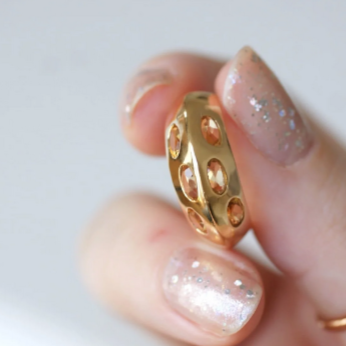
Pyramidal gold and citrine ring
A hue of sun, light and energy, yellow finally shines! Proof that it's a happy color, it's the color of smileys (or "frimousses" in the language of Molière).
We conclude with a quote from Richard le Gallienne: "When you think about it, you hardly realize how many important and pleasant things in life are yellow.
At Galerie Pénélope, sunshine is year-round! So why not prolong your summer or brighten up your autumn with our yellow selection?
https://galeriepenelope.com/products/broche-elephant-vintage-or-amati?_pos=1&_sid=74acb62c2&_ss=r&variant=43028807909594
https://galeriepenelope.com/products/bague-cocktail-citrine-or?_pos=7&_sid=6369cd960&_ss=r&variant=34980849778846
